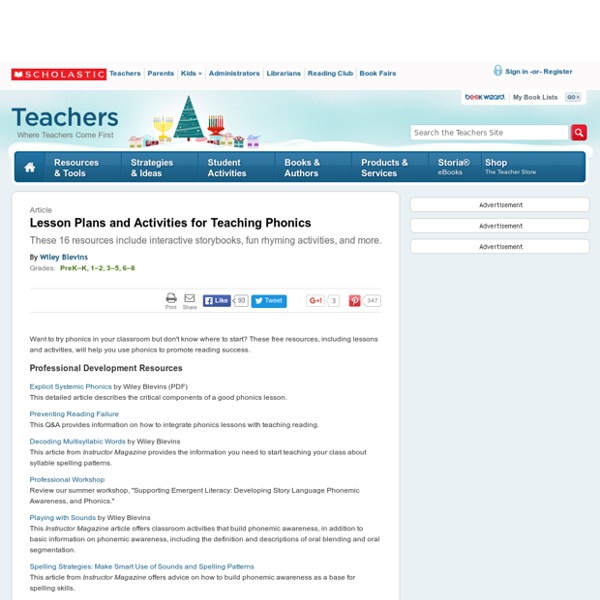Lesson Plans and Activities for Teaching Phonics

Between the Lions . The Quiet Machine | PBS KIDS!
Come play again later! Come play again tomorrow!
English Grammar, Vocabulary, Pronunciation Exercises for ESL Teachers and Students
Building Language for Literacy Home
PRIVACY POLICY · Terms of Use · TM ® & © 2017 Scholastic Inc. All Rights Reserved. Teacher's Activity Guide
Wilson - Ten Simple Phonics Activities Requiring Little Preparation
The Internet TESL Journal Matthew Wilsoneducationaladvisor [at] gmail.comSendai Board of Education, (Sendai, Japan) Introduction Getting students to discover and practice the connections between letters and the sounds they represent should be an important part of any English class routine. The following are ten activities that can assist you in practicing phonics at any point in your lesson: Letters on the Board At first, the teacher writes some letters on the board. Speed Reading Write a number of words on the board. Battleship Phonics This is based on the popular game Battleship. Phonics Bingo Write a good number of sounds on the board, e.g., pha, ma, la, ga. Criss-cross Phonics All the students stand up. Missing Sound Draw or show an image on the blackboard. Two Sounds Good to practice sound distinction. Beginning/Middle/End Students copy down the chart you provided on the board which is divided into three sections. Ball and Cap Game The students pass around a hat and a ball. Pen and Eraser
Learn to Read: Free Phonics worksheets, Phonics Games, Phonics Activities and Phonics Flashcards
Phonics Flashcards Activities CVC Flashcards -with uppercase alphabets CVC Flashcards -with lowercase alphabets Long vowel (magic E) flashcards -with lowercase alphabets R Controlled words flashcards Lowercase LettersUppercase LettersAlphabet Train GameAlphabet Ordering Games Kids Phonics learning games: Phonics Games To link to this page, copy the following code to your site: <a href="
How to learn the letters and sounds of the Alphabet
How to teach … phonics | Teacher Network
From the much maligned key stage 1 screening test which asks children to sound out words such as "drall", "halp" and "snope", to the current embrace of the synthetic phonics model in UK schools, how to teach reading and writing is a subject of hot debate. All schools will have their own favourite phonics programme. But whether you are Floppy fans or find joy in Jolly or elsewhere, the Guardian Teacher Network has some excellent resources to complement phonics work in school and at home and help your pupils to learn the most important lessons of their lives. An inspiring start is the Teach your monster to read game to practice the first steps of reading. Children can get to grips with graphemes in this ready-made "ir, ue, aw, ue, wh, ph" PowerPoint with sounds and action buttons, and here is the "ay, ou, ie, ea, oy" version. Thanks to Alan Davies from Thrass for sharing these English phonics guide and check guidance notes for teachers. • This article was amended on 5 April 2013.
Phonics Activities, Learn to Read, for Preschool, Kindergarten, First Grade, 2nd Grade
Related:
Related:




Not only does this site provide a lot of example phonics lessons, but it takes the time to describe the necessary components of a well-designed lesson. The fact that the site has interactive, online games is just icing on the cake. by theofficepicnic Jul 25
if dogs are a man's best friend, and diamond's are a girls best friend, it could probably be said that Scholastic is a Teacher's best friend. This site has teacher materials for professional development, student activities, and lesson plans, all easily accessible. by ttribou Jul 24
Scholastic is always a good bet for help for teachers. This site had lots of good ideas for lesson plans, activities, and reading activities. You can access more than just phonics activities from one place and that is helpful for any teacher. by vickiekwiecinski Jul 2
This is an article specifically for ideas for teaching phonics. There are a couple online games for learning and literacy, there are some sample activities from Scholastic, and there are some key ideas for introducing phonics and developing structure for students. by kbeck07 Nov 4